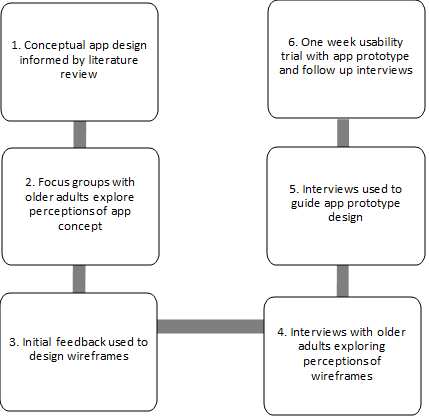Over the last few months we have been prototyping and trialling the app in several stages. After some initial co-design interviews with older adults discussing the app concept and viewing app wireframes/mock-ups, the first version of the app was developed and released across platforms (iOS and Android). This app was trialled in a usability study with 12 older adults who used the app for 1 week. Feedback from that trial and ongoing co-design sessions led to the second version of the app being released, and another trial commenced with 17 older adults using the app for 2 weeks. This trial also focused on usability issues as well as testing out the feasibility of recruiting socially isolated older adults in a rural community. This recruitment was facilitated by Wellmoor (link), a community organisation based in Dartmoor, UK.
We have just wrapped up this field trial so the results are not available yet, although the data are accessible: https://doi.org/10.21954/ou.rd.16988551.v1.
Below we report on the preliminary findings coming out of the concept interviews and usability study interviews.
Usability study – preliminary findings
We have followed an iterative app design process:

Our qualitative lived experience research conducted earlier in the project enabled identification of key issues arising out of the COVID-19 pandemic for older adults:
Lockdown measures facilitated loss in their social and emotional lives. Participants’ wellbeing was impacted by fears for their safety and fears of being forgotten. This reflected loneliness related worries and thoughts. The participants also discussed their responses and strategies for resilience such as by creating support from feeling connected to community.
App and research trials
We identified that a digital platform needs to help people to add new social contacts/group memberships over time, to reflect on their daily social contacts and activities, and to enable active self-report and reflection on loneliness/wellbeing. Additionally, due to age related stereotypes, the platform needed to be engaging and non-stigmatising, and non-detrimental to wellbeing. Finally, the digital platform needed to be designed in collaboration with older adults so that they felt the tool was made for them and their needs. We have developed and trialled a digital app for the purpose of addressing older adults’ social support needs.
June-August 2021 – Usability trial
A one-week trial explored usability of the first working app prototype. Twelve participants were recruited from an older adult research participation panel and logged their mood and circle as part of their daily routine.
Trial findings
Analysis of the usability study qualitative data revealed four main themes to explain how using the app interacted with participants experiences of their social worlds. Logging daily mood and activities allows reflection which aids positive reappraisal of existing social connections. This can enhance group identification, increasing belonging amongst members of a persons’ social groups. The map feature bridges existing connections to individuals participants would like to connect with more frequently, and activity reflection facilitates shared actions with members of their networks.
In sum, we have embedded intervention processes into the app design which theoretically allow older adults to overcome COVID-19 related loneliness through enhanced identification and belonging to existing social groups who in turn can offer meaningful reciprocal support for older adults. The forthcoming evaluation trial will evaluate the efficacy of these app features.
